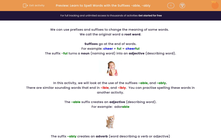We can use prefixes and suffixes to change the meaning of some words.
We call the original word a root word.
Suffixes go at the end of words.
For example: cheer + ful = cheerful
The suffix -ful turns a noun (naming word) into an adjective (describing word).

In this activity, we will look at the use of the suffixes -able, and -ably.
There are similar sounding words that end in -ible, and -ibly. You can practise spelling these words in another activity.
The -able suffix creates an adjective (describing word).
For example: adorable

The suffix -ably creates an adverb (word describing a verb or adjective)
For example: changeable, comfortably
But how do we know when to use -able and -ably rather than -ible and -ibly?
If a word has a word in the same family that ends in -ation, that usually means that it uses -able, -ably.
For example considerable and consideration.
The -able ending is also usually used if a complete root word can be heard before it. If the root word ends in y, this is often changed to an i.
For example: enjoyable, reliable
Here are some examples of words that use these suffixes that we will practise in this activity:
adorable
adorably
changeable
noticeable
dependable
enjoyable
reliable
You can listen to them here:
You can break the words up into the root and suffix to help you to spell them
ador able
ador ably
change able
notice able
depend able
enjoy able
reli able
Use Look, Say, Cover, Write, Check to practise spellings a few times before we begin the activities.
.jpg)








